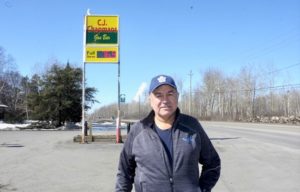Northern Superior Region Anishinabek First Nations announce closures amidst COVID-19 pandemic

By Rick Garrick
FORT WILLIAM FIRST NATION — The Northern Superior Region communities of Fort William, Netmizaaggamig Nishnaabeg and Biigtigong Nishnaabeg have announced closures or partial closures as of Mar. 29 due to the novel coronavirus disease 2019 (COVID-19) global pandemic.
Fort William passed a band council resolution on Mar. 24 to temporarily restrict access to residential areas from 8 p.m. to 6 a.m. beginning on the evening of Mar. 25, with all residents and emergency response vehicles exempt from the access restrictions. All businesses are also ordered to be closed during the closure timeframe. Fort William is located across the Kaministiquia River from Thunder Bay.
“Next week we will probably have 24-hour security on the checkpoints,” says Fort William Chief Peter Collins on Mar. 27. “The gas bars and cigarette suppliers are still open — those are considered an essential service to everybody.”
Chief Collins says the 24-hour security would be step two of the community’s emergency response to COVID-19.
“If things break out in [Thunder Bay], step three is full closure of the community,” Chief Collins says. “We’re not there yet. We’re learning how to deal with this as [is] every Canadian across the country, every First Nation across the country.”
Fort William set up the security checkpoints on Mission Rd., Mountain Rd. and City Rd. to restrict vehicle and pedestrian traffic to the community’s residential areas.
“We’re not trying to shut this person down, shut that person down, shut this business down or shut that business down,” Chief Collins says. “We’re just trying to do what we feel is in the best interest of our community.”
Chief Collins says the community “seems to be comfortable” with the access restrictions after the first two nights.
He also emphasized the need for people to follow social distancing and other recommendations such as self-isolation and proper washing of hands to reduce the spread of COVID-19.
“Just keep that distance,” Chief Collins says. “It doesn’t hurt to talk to your neighbour from six feet away.”
Netmizaaggamig Nishnaabeg, formerly Pic Mobert First Nation, passed a band council resolution on Mar. 20 closing the community to non-residents, effective immediately.
“This was a necessary and timely decision to make in light of the global pandemic and the state of emergency in place in Ontario, and means that our council is doing all it can in order to protect our citizens and prevent the spread of this dangerous virus,” says Netmizaaggamig Nishnaabeg Chief Johanna Desmoulin in a Mar. 20 press release.
The community, which is located about 360 kilometres east of Thunder Bay, established an Emergency Pandemic Team to monitor local, regional and provincial/national developments and to propose and implement local measures.
Netmizaaggamig Nishnaabeg also established a 24-hour manned roadblock at the entrance to the community with only current residents allowed to enter. Delivery trucks with essential supplies may be exempt from the closure with the condition that drivers have no or minimal contact with residents. Patients of the Ontario Addiction Treatment Centres clinic in the community are also allowed access on the condition that they complete a screening process. If eligible to enter, they are limited to entering with an escort.
Biigtigong Nishnaabeg, located about 320 kilometres east of Thunder Bay, declared a State of Emergency on Mar. 23, which includes a 24-hour checkpoint on the entrance to the community. Only residents, essential service providers, goods and service delivery staff and emergency response personnel are allowed access to the community until further notice.
Thunder Bay had three confirmed cases of COVID-19 as of Mar. 29.


